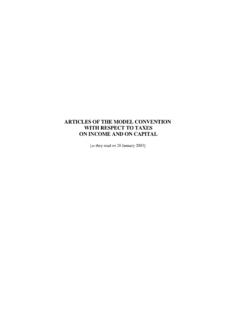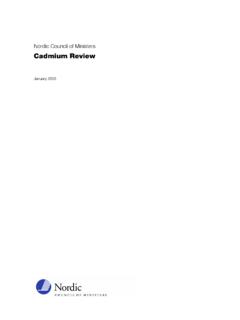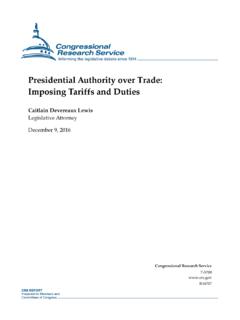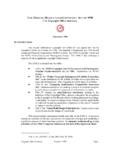Transcription of 19x27 CRC Template - OECD.org
1 OECD/G20 Base Erosion and Profit Shifting Project2015 Final ReportsExecutive us @OECDtax ninog / FotoliaOECD/G20 Base Erosion and Profit Shifting Project executive summaries 2015 Final Reports Photo credits: Cover ninog / OECD 2015 You can copy, download or print OECD content for your own use, and you can include excerpts from OECD publications, databases and multimedia products in your own documents, presentations, blogs, websites and teaching materials, provided that suitable acknowledgment of the source and copyright owner is given. All requests for public or commercial use and translation rights should be submitted to Requests for permission to photocopy portions of this material for public or commercial use shall be addressed directly to the Copyright Clearance Center (CCC) at or the Centre fran ais d'exploitation du droit de copie (CFC) at TABLE OF CONTENTS 3 OECD 2015 Table of contents Action 1 Addressing the Tax Challenges of the Digital Economy.
2 5 Action 2 Neutralising the Effects of Hybrid Mismatch Arrangements .. 9 Action 3 Designing Effective Controlled Foreign Company Rules .. 13 Action 4 Limiting Base Erosion Involving Interest Deductions and Other Financial Payments .. 15 Action 5 Countering Harmful Tax Practices More Effectively, Taking into Account Transparency and Substance .. 19 Action 6 Preventing the Granting of Treaty Benefits in Inappropriate Circumstances .. 21 Action 7 Preventing the Artificial Avoidance of Permanent Establishment Status .. 23 Actions 8-10 Aligning Transfer Pricing Outcomes with Value Creation .. 27 Action 11 Measuring and Monitoring BEPS .. 31 Action 12 Mandatory Disclosure Rules .. 33 Action 13 Transfer Pricing Documentation and Country-by-Country Reporting .. 37 Action 14 Making Dispute Resolution Mechanisms More Effective .. 41 Action 15 Developing a Multilateral Instrument to Modify Bilateral Tax Treaties.
3 43 ACTION 1. ADDRESSING THE TAX CHALLENGES OF THE DIGITAL ECONOMY 5 OECD 2015 Action 1 Addressing the Tax Challenges of the Digital Economy Action 1 of the base erosion and profit shifting (BEPS) Action Plan deals with the tax challenges of the Digital Economy. Political leaders, media outlets, and civil society around the world have expressed growing concern about tax planning by multinational enterprises (MNEs) that makes use of gaps in the interaction of different tax systems to artificially reduce taxable income or shift profits to low-tax jurisdictions in which little or no economic activity is performed. In response to this concern, and at the request of the G20, the Organisation for Economic Co-operation and Development (OECD) published an Action Plan on Base Erosion and Profit Shifting (BEPS Action Plan, OECD, 2013) in July 2013. Action 1 of the BEPS Action Plan calls for work to address the tax challenges of the digital economy.
4 The Task Force on the Digital Economy (TFDE), a subsidiary body of the Committee on Fiscal Affairs (CFA) in which non-OECD G20 countries participate as Associates on an equal footing with OECD countries, was established in September 2013 to develop a report identifying issues raised by the digital economy and detailed options to address them by September 2014. The TFDE consulted extensively with stakeholders and analysed written input submitted by business, civil society, academics, and developing countries. It issued an interim report in September 2014 and continued its work in 2015. The conclusions regarding the digital economy, the BEPS issues and the broader tax challenges it raises, and the recommended next steps are contained in this final report. The digital economy is the result of a transformative process brought by information and communication technology (ICT), which has made technologies cheaper, more powerful, and widely standardised, improving business processes and bolstering innovation across all sectors of the economy.
5 Because the digital economy is increasingly becoming the economy itself, it would be difficult, if not impossible, to ring-fence the digital economy from the rest of the economy for tax purposes. The digital economy and its business models present however some key features which are potentially relevant from a tax perspective. These features include mobility, reliance on data, network effects, the spread of multi-sided business models, a tendency toward monopoly or oligopoly and volatility. The types of business models include several varieties of e-commerce, app stores, online advertising, cloud computing, participative networked platforms, high speed trading, and online payment services. The digital economy has also accelerated and changed the spread of global value chains in which MNEs integrate their worldwide operations. 6 ACTION 1. ADDRESSING THE TAX CHALLENGES OF THE DIGITAL ECONOMY OECD 2015 BEPS issues in the digital economy While the digital economy and its business models do not generate unique BEPS issues, some of its key features exacerbate BEPS risks.
6 These BEPS risks were identified and the work on the relevant actions of the BEPS Project was informed by these findings and took these issues into account to ensure that the proposed solutions fully address BEPS in the digital economy. Accordingly, It was agreed to modify the list of exceptions to the definition of PE to ensure that each of the exceptions included therein is restricted to activities that are otherwise of a preparatory or auxiliary character, and to introduce a new anti-fragmentation rule to ensure that it is not possible to benefit from these exceptions through the fragmentation of business activities among closely related enterprises. For example, the maintenance of a very large local warehouse in which a significant number of employees work for purposes of storing and delivering goods sold online to customers by an online seller of physical products (whose business model relies on the proximity to customers and the need for quick delivery to clients) would constitute a permanent establishment for that seller under the new standard.
7 It was also agreed to modify the definition of PE to address circumstances in which artificial arrangements relating to the sales of goods or services of one company in a multinational group effectively result in the conclusion of contracts, such that the sales should be treated as if they had been made by that company. For example, where the sales force of a local subsidiary of an online seller of tangible products or an online provider of advertising services habitually plays the principal role in the conclusion of contracts with prospective large clients for those products or services, and these contracts are routinely concluded without material modification by the parent company, this activity would result in a permanent establishment for the parent company. The revised transfer pricing guidance makes it clear that legal ownership alone does not necessarily generate a right to all (or indeed any) of the return that is generated by the exploitation of the intangible, but that the group companies performing the important functions, contributing the important assets and controlling economically significant risks, as determined through the accurate delineation of the actual transaction, will be entitled to an appropriate return.
8 Specific guidance will also ensure that the transfer pricing analysis is not weakened by information asymmetries between the tax administration and the taxpayer in relation to hard-to-value intangibles, or by using special contractual relationships, such as a cost contribution arrangement. The recommendations on the design of effective CFC include definitions of CFC income that would subject income that is typically earned in the digital economy to taxation in the jurisdiction of the ultimate parent company. It is expected that the implementation of these measures, as well as the other measures developed in the BEPS Project ( minimum standard to address treaty shopping arrangements, best practices in the design of domestic rules on interest and other deductible financial payments, application to IP regimes of a substantial activity requirement with a nexus approach ), will substantially address the BEPS issues exacerbated by the digital economy at the level of both the market jurisdiction and the ACTION 1.
9 ADDRESSING THE TAX CHALLENGES OF THE DIGITAL ECONOMY 7 OECD 2015 jurisdiction of the ultimate parent company, with the aim of putting an end to the phenomenon of so-called stateless income. Broader tax challenges raised by the digital economy The digital economy also raises broader tax challenges for policy makers. These challenges relate in particular to nexus, data, and characterisation for direct tax purposes, which often overlap with each other. The digital economy also creates challenges for value added tax (VAT) collection, particularly where goods, services and intangibles are acquired by private consumers from suppliers abroad. The TFDE discussed and analysed a number of potential options to address these challenges, including through an analysis of their economic incidence, and concluded that: The option to modify the exceptions to PE status in order to ensure that they are available only for activities that are in fact preparatory or auxiliary in nature that was adopted as a result of the work on Action 7 of the BEPS Project is expected to be implemented across the existing tax treaty network in a synchronised and efficient manner via the conclusion of the multilateral instrument that modifies bilateral tax treaties under Action 15.
10 The collection of VAT/GST on cross-border transactions, particularly those between businesses and consumers, is an important issue. Countries are thus recommended to apply the principles of the International VAT/GST Guidelines and consider the introduction of the collection mechanisms included therein. None of the other options analysed by the TFDE, namely (i) a new nexus in the form of a significant economic presence, (ii) a withholding tax on certain types of digital transactions, and (iii) an equalisation levy, were recommended at this stage. This is because, among other reasons, it is expected that the measures developed in the BEPS Project will have a substantial impact on BEPS issues previously identified in the digital economy, that certain BEPS measures will mitigate some aspects of the broader tax challenges, and that consumption taxes will be levied effectively in the market country.

















